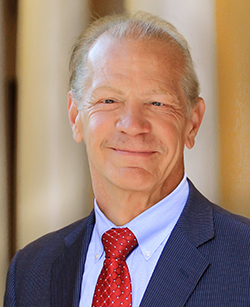Here's How to Reform Healthcare
BY RANDY OOSTRA '77

Our nation's healthcare system is a mess. The industry spends $3 trillion annually and constitutes more than 17 percent of the nation's GDP. For patients and their families, shouldering the burden of rising healthcare costs often leads to financial hardship and is the No. 1 cause of personal bankruptcy.
Our system is fragmented, unaffordable and lacks a key element: It fails to address the social determinants of health—the conditions in which people are born, grow, live, work and age.
Research indicates 20 percent of an individual's health is based on heredity and access to care, while the remaining 80 percent is determined by physical environment, health behaviors and socioeconomic factors.
The impact of social determinants on the cost and quality of healthcare has never been greater. In 2013 alone, Americans spent about $280 billion on care for people suffering from diabetes, heart disease, and back and neck pain—all of which are fueled in large part by social conditions and personal behaviors.
Given this, our nation, communities and healthcare systems must invest significantly more to affect these social determinants of health.
In recent years, a growing number of health systems—including my own, ProMedica—have embraced their role as community anchor institutions by making such investments. Efforts include screening for food insecurity, reducing infant mortality, improving mental health, addressing housing and transportation needs, helping to ensure personal safety, and aiding urban economic development.
ProMedica has learned much on this journey. For instance, the cost of hunger nationally is estimated to be at least $167.5 billion, of which $130 billion is for healthcare. Food insecurity impacts nearly 13 percent of households, including 19 percent of homes with children, 33 percent of single mothers with children, and seniors at a rate in excess of 30 percent.
We began screening patients for food insecurity, which led to other initiatives, including food pharmacies (whereby providers write prescriptions for food), food reclamation (we've served more than 300,000 pounds of food that would have been thrown away!), weekend backpack programs for school kids, and building and operating an inner-city grocery store that also offers job training.
As our knowledge grew about the link between hunger and health outcomes, we recognized the need for clinicians to understand more about patients' circumstances: Do they live in a safe home with working utilities? Can they afford to feed their families without neglecting other bills? Do they have transportation? This year, we'll expand screenings to include 10 health determinants and ensure patients in need are connected with community resources.
This approach should be replicated nationwide. Too many health professionals use a litany of excuses for avoiding screening for these determinants: It's not their job, they don't have the resources, or they won't be compensated. Still others say they're concerned that if their patients identify an unmet need, they won't know how to address it. That's the point! As an industry, we need to think less about the business side and more about our mission of caring.
So, what do we propose?
- By 2019, providers should screen each Medicare patient on key social determinants. Benchmark data should be used to inform research and identify key areas in which to offer interventions.
- By 2021, hospitals should provide all patients a resource guide to help them meet identified needs.
- Nonprofit hospitals should quantify these services and report them as approved expenses to meet their charitable-contribution requirements.
- Incentives should be offered to physicians to encourage them to focus on the social determinants of health, starting with mental health and hunger.
- Federal research should be conducted to track the impact of these measures and how they affect clinical outcomes.
Across our nation, we have dedicated health professionals who rise to the challenges and responsibilities of caring for others in need. But each day as they answer their calling, we refuse to heed the signs of a collapsing system weighed down by a model that was conceived with good intentions but has run its course.
We need a new model.
Randy Oostra is president and CEO of ProMedica, a Toledo-based nonprofit healthcare system. This essay is excerpted from one published in the Pittsburgh Post-Gazette in February.
 NWC alumni and students share the best places on campus to concentrate on homework—and the best ways to stay motivated.
NWC alumni and students share the best places on campus to concentrate on homework—and the best ways to stay motivated. Northwestern alumni doctors take exceptional care of patients and pioneer advances that offer healing to whole populations.
Northwestern alumni doctors take exceptional care of patients and pioneer advances that offer healing to whole populations. Back when the Watergate scandal was dominating the news, Northwestern's Choral Readers performed on the steps of the U.S. Capitol.
Back when the Watergate scandal was dominating the news, Northwestern's Choral Readers performed on the steps of the U.S. Capitol.
Classic Comments
All comments are moderated and need approval from the moderator before they are posted. Comments that include profanity, or personal attacks, or antisocial behavior such as "spamming" or other inappropriate comments or material will be removed from the site. We will take steps to block users who violate any of our terms of use. You are fully responsible for the content that you post. Comments posted do not reflect the views or values of Northwestern College.